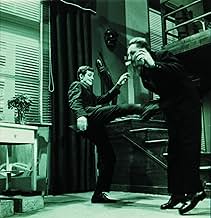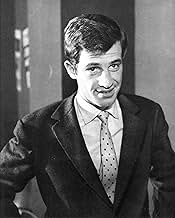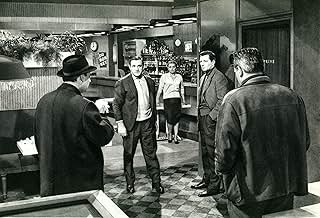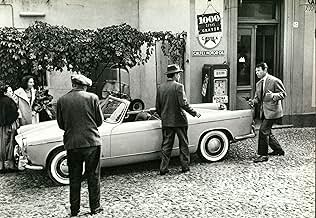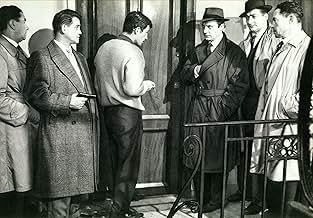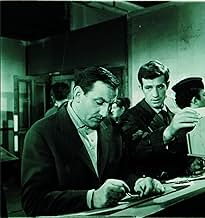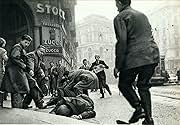AVALIAÇÃO DA IMDb
7,5/10
4,8 mil
SUA AVALIAÇÃO
Adicionar um enredo no seu idiomaA ruthless criminal flees from the pursuit, involving more and more casualties.A ruthless criminal flees from the pursuit, involving more and more casualties.A ruthless criminal flees from the pursuit, involving more and more casualties.
- Direção
- Roteiristas
- Artistas
Simone Desmaison
- Thérèse Davos
- (as Simone France)
Jean-Pierre Zola
- Le patron de l'agence privée
- (as J.P. Zola)
Philippe March
- Jean Martin
- (as Aimé de March)
Avaliações em destaque
Classe Tous Risques (The Big Risk) is repeatedly recommended every time I look up a Jean-Pierre Melville film that I had to give it a watch as soon as possible. Since I've been discovering Melville and seemingly working backwards through his filmography, it would be easy for me to mistake this as one of his films, but it was made in 1960, by Claude Sautet, before Melville would come and stake his claim on french neo-noir.
Classe Tous Risques has two of the best lead men of the time, Lino Ventura and Jean-Paul Belmondo. Ventura plays Abel, a gangster exiled in Italy with his wife and two kids, who wants to come back to Paris because the police are closing in on him. After a roaring and fast paced opening with a big surprise, Abel eventually gets hooked up with Eric Stark (Belmondo) who wants to get into the criminal underworld. Stark becomes Abel's chauffeur and eventual only friend in an underworld that turns it's back on Abel after everything he's done and been through. The film shows the the duality of the two men, the older Abel at the end of his time after tragedy strikes him, and the younger Eric starting off the same way Abel did, falling in love with a beautiful woman who sticks with her man despite the world they are a part of. It never ends pretty for them, or their loved ones. Its one thing to see a individual criminal come to his demise, its different when he has loved ones he risks taking down with him.
Much like Melville's film, the seemingly simple story gets more subtlety complicated as it goes along. As usual, as what I feel with Melville's films, it left my head spinning (in a good way) and dying to re watch it again to pick up what I missed the first time. Classe Tous Risques is a definite keeper.
Classe Tous Risques has two of the best lead men of the time, Lino Ventura and Jean-Paul Belmondo. Ventura plays Abel, a gangster exiled in Italy with his wife and two kids, who wants to come back to Paris because the police are closing in on him. After a roaring and fast paced opening with a big surprise, Abel eventually gets hooked up with Eric Stark (Belmondo) who wants to get into the criminal underworld. Stark becomes Abel's chauffeur and eventual only friend in an underworld that turns it's back on Abel after everything he's done and been through. The film shows the the duality of the two men, the older Abel at the end of his time after tragedy strikes him, and the younger Eric starting off the same way Abel did, falling in love with a beautiful woman who sticks with her man despite the world they are a part of. It never ends pretty for them, or their loved ones. Its one thing to see a individual criminal come to his demise, its different when he has loved ones he risks taking down with him.
Much like Melville's film, the seemingly simple story gets more subtlety complicated as it goes along. As usual, as what I feel with Melville's films, it left my head spinning (in a good way) and dying to re watch it again to pick up what I missed the first time. Classe Tous Risques is a definite keeper.
"Classe tous risques" feels like the granddaddy of "The Sopranos" in mixing the criminal and the domestic, and of the buddy film to feel as contemporary as "Reservoir Dogs."
Even as these gangsters are affectionately entangled with wives, children, lovers and parents, they are coldly ruthless, and we are constantly reminded they are, no matter what warm situation we also see them in. They can tousle a kid's hair - and then shoot a threat in cold blood. The key is loyalty, and the male camaraderie is beautifully conveyed, without ethnic or class stereotypes, even as their web of past obligations and pay backs narrows into suspicion and paranoia, as the old gang is in various stages of parole, retirement, out on bail or into new, less profitable ventures. An intense accusation is of sending a stranger to perform an old escape scenario. It is a high point of emotion when a wife is told off that she's not the one the gangster is friends with, while virtually the only time we hear music on the soundtrack is when he recalls his wife.
Streetscapes in Italy and France are marvelously used, in blinding daylight to dark water and highways, from the opening set up of a pair of brazen robbers -- who are traveling with one's wife and two kids. Rugged, craggy Lino Ventura captures the screen immediately as the criminal dad. And the second thug is clearly a casually avuncular presence in their lives, as they smoothly coordinate the theft and escape, in cars, buses, on boats and motorcycles, in easy tandem. This is not the cliché crusty old guy softened with the big-eyed orphan; these are their jobs and their families and they intersect in horrific ways.
The film pulls no punches in unexpectedly killing off characters, directly and as collateral damage, and challenging our sympathy for them, right through to the unsentimental end, which is probably why there was never an American remake.
It seems so fresh that it's not until Jean-Paul Belmondo enters almost a third of the way into the film, looking so insouciant as a young punk, that one realizes that this is from 1960. Sultry Sandra Milo has smart and terrific chemistry with him, from an ambulance to an elevator to a hospital bed.
While the Film Forum was showing a new 35 mm print with newly translated subtitles, it was not pristine. The program notes explained that the title refers to a kind of insurance policy and is pun on "tourist class."
Even as these gangsters are affectionately entangled with wives, children, lovers and parents, they are coldly ruthless, and we are constantly reminded they are, no matter what warm situation we also see them in. They can tousle a kid's hair - and then shoot a threat in cold blood. The key is loyalty, and the male camaraderie is beautifully conveyed, without ethnic or class stereotypes, even as their web of past obligations and pay backs narrows into suspicion and paranoia, as the old gang is in various stages of parole, retirement, out on bail or into new, less profitable ventures. An intense accusation is of sending a stranger to perform an old escape scenario. It is a high point of emotion when a wife is told off that she's not the one the gangster is friends with, while virtually the only time we hear music on the soundtrack is when he recalls his wife.
Streetscapes in Italy and France are marvelously used, in blinding daylight to dark water and highways, from the opening set up of a pair of brazen robbers -- who are traveling with one's wife and two kids. Rugged, craggy Lino Ventura captures the screen immediately as the criminal dad. And the second thug is clearly a casually avuncular presence in their lives, as they smoothly coordinate the theft and escape, in cars, buses, on boats and motorcycles, in easy tandem. This is not the cliché crusty old guy softened with the big-eyed orphan; these are their jobs and their families and they intersect in horrific ways.
The film pulls no punches in unexpectedly killing off characters, directly and as collateral damage, and challenging our sympathy for them, right through to the unsentimental end, which is probably why there was never an American remake.
It seems so fresh that it's not until Jean-Paul Belmondo enters almost a third of the way into the film, looking so insouciant as a young punk, that one realizes that this is from 1960. Sultry Sandra Milo has smart and terrific chemistry with him, from an ambulance to an elevator to a hospital bed.
While the Film Forum was showing a new 35 mm print with newly translated subtitles, it was not pristine. The program notes explained that the title refers to a kind of insurance policy and is pun on "tourist class."
10Dziga7
I saw this film at Telluride Film Festival in 1997, where one of the screenwriters, José Giovanni, was being honored. It ranks highly as a great noir-crime-drama, incredible performances by Belmondo and Lino Ventura. The attention given to every character, and complex psychological portrayals, detailing loyalty, treachery, love, and hope, are tremendous. It is an excellent drama, an excellent thriller, and an excellent film. Up there with the best of Melville. (The title in English 'Class all risk,' in French 'Classe tous risques' is word-play on 'Classe Touriste,' meaning 'Tourist Class'.
10urigafni
Odd one should be able to stumble into "Classe Tous Risques" only by chance; it should be on any "best of film-noir" list, including IMDb's.
Lino Ventura is as good as ever; knowing of his dire, delicate family situation gives extra weight to his almost expressionless face and brief dialogues. Belmondo's restrained performance under Sautet's firm direction only shows what a wonderful actor he could - and should -have been.
"Classe Tous Risques" is utterly mininal, dry and cold, without Melville's artistic scenery, pretty faces and fancy cars. It is almost film-noir meet neo-realism. Davos' few, hard words to his children describing their life of secrecy from there on get a hold on your throat to the end of the film.
The final sentence of the film - a voice-over telling of Davos' end in no more than ten dry, sombre words - leaves you with a hard punch in the stomach.
A true jewel in the great crown of French film-noir.
Lino Ventura is as good as ever; knowing of his dire, delicate family situation gives extra weight to his almost expressionless face and brief dialogues. Belmondo's restrained performance under Sautet's firm direction only shows what a wonderful actor he could - and should -have been.
"Classe Tous Risques" is utterly mininal, dry and cold, without Melville's artistic scenery, pretty faces and fancy cars. It is almost film-noir meet neo-realism. Davos' few, hard words to his children describing their life of secrecy from there on get a hold on your throat to the end of the film.
The final sentence of the film - a voice-over telling of Davos' end in no more than ten dry, sombre words - leaves you with a hard punch in the stomach.
A true jewel in the great crown of French film-noir.
A discovery. Made in 1960, at the peak of the French New Wave, 'Classe Tous Risques' is a classic gangsters movie, directed by Claude Sautet, the screen adaptation of a novel by José Giovanni. Like many other filmmakers who began their careers during the New French Wave, Sautet and Giovanni, even though they did not belong to the current, became known both as directors and screenwriters of many films of this genre, a genre which a few years later will draw the attention of some of the most famous directors of the New Wave such as Melville or Chabrol. The film brings together on the same screen two of the actors specializing in tough guys roles in French films noir. Lino Ventura was already a well-known actor, while Jean-Paul Belmondo was building up his fame and full of creative hunger. In that year 1960 his name appeared on the credits of no less than eight films. The presence of Ventura and Belmondo, who on the screen as in reality played the roles of master and disciple is just one of the arguments that make 'Classe Tous Risques' a film worth seeing 60 years after its premiere.
Many films had already been made about the 'code of honor' of the underworld, and more would follow. Let's put aside the moral judgments about the 'honor' of those who rob, kill each other or kill innocent people in cold blood, but otherwise they are good familist and people capable of falling in love. Let's admit that the theme is an excellent starting point or core subject for thriller novels and films noir. This is also the case with the story of gangster Abel Davos (Lino Ventura), sentenced to death and pursued by all police of Europe, whose wife is killed when they try to return to France, who is betrayed by his old friends in crime and thus left to fight for survival with his two 8- and 4-year-old boys in her care. The help comes from Eric Stark (Jean-Paul Belmondo), a young gangster in the making, for whom Davos was kind of a moral model, precisely because of his respect for the mob codes of honor. The connection between the two (friendship, master - disciple) is the axis of the film.
Lino Ventura acts wonderfully in a type of role in which he specialized in those years, the tough guy followed by everyone who carries a gun, and whose chances of surviving until 'Fin' appears on the screen are low. He is however surpassed, I believe, in this film by Jean-Paul Belmondo, who manages to give a positive touch to his role, with the help of Sandra Milo as the young actress with whom Eric begins a relationship that may be his chance not to repeat the fate of Abel . The filming has rhythm and fluency, the characters are believable and the action flows interestingly until the final part, which confronts us with a less common ending for films of this genre, perhaps inspired by docu-novels that were also in vogue in those years. It's worth, I think, to see the movie and get to the end to judge by yourselves.
Many films had already been made about the 'code of honor' of the underworld, and more would follow. Let's put aside the moral judgments about the 'honor' of those who rob, kill each other or kill innocent people in cold blood, but otherwise they are good familist and people capable of falling in love. Let's admit that the theme is an excellent starting point or core subject for thriller novels and films noir. This is also the case with the story of gangster Abel Davos (Lino Ventura), sentenced to death and pursued by all police of Europe, whose wife is killed when they try to return to France, who is betrayed by his old friends in crime and thus left to fight for survival with his two 8- and 4-year-old boys in her care. The help comes from Eric Stark (Jean-Paul Belmondo), a young gangster in the making, for whom Davos was kind of a moral model, precisely because of his respect for the mob codes of honor. The connection between the two (friendship, master - disciple) is the axis of the film.
Lino Ventura acts wonderfully in a type of role in which he specialized in those years, the tough guy followed by everyone who carries a gun, and whose chances of surviving until 'Fin' appears on the screen are low. He is however surpassed, I believe, in this film by Jean-Paul Belmondo, who manages to give a positive touch to his role, with the help of Sandra Milo as the young actress with whom Eric begins a relationship that may be his chance not to repeat the fate of Abel . The filming has rhythm and fluency, the characters are believable and the action flows interestingly until the final part, which confronts us with a less common ending for films of this genre, perhaps inspired by docu-novels that were also in vogue in those years. It's worth, I think, to see the movie and get to the end to judge by yourselves.
Você sabia?
- CuriosidadesCo-writer/Director Claude Sautet said after the shooting that he did not know that the Abel Davos - Danos - character was inspired by a gangster who collaborated with the Nazis against French resistance and Jews during German occupation.
- Citações
Eric Stark: The best thing about me is my left hook.
- ConexõesFeatured in Claude Sautet ou La magie invisible (2003)
Principais escolhas
Faça login para avaliar e ver a lista de recomendações personalizadas
- How long is The Big Risk?Fornecido pela Alexa
Detalhes
- Data de lançamento
- Países de origem
- Central de atendimento oficial
- Idiomas
- Também conhecido como
- Encurralado
- Locações de filme
- Empresas de produção
- Consulte mais créditos da empresa na IMDbPro
Bilheteria
- Faturamento bruto nos EUA e Canadá
- US$ 132.928
- Fim de semana de estreia nos EUA e Canadá
- US$ 11.945
- 20 de nov. de 2005
- Faturamento bruto mundial
- US$ 132.928
- Tempo de duração
- 1 h 50 min(110 min)
- Cor
- Proporção
- 1.66 : 1
Contribua para esta página
Sugerir uma alteração ou adicionar conteúdo ausente




